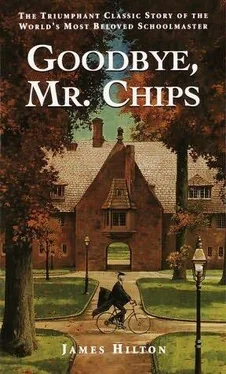Her name was Katherine Bridges; she was twenty-five—young enough to be Chips's daughter. She had blue, flashing eyes and freckled cheeks and smooth straw-coloured hair. She too was staying at a farm, on holiday with a girl friend, and as she considered herself responsible for Chips's accident, she used to bicycle along the side of the lake to the house in which the quiet, middle-aged, serious-looking man lay resting.
That was how she thought of him at first. And he, because she rode a bicycle and was unafraid to visit a man alone in a farmhouse sitting room, wondered vaguely what the world was coming to. His sprain put him at her mercy, and it was soon revealed to him how much he might need that mercy. She was a governess out of a job, with a little money saved up; she read and admired Ibsen; she believed that women ought to be admitted to the universities; she even thought they ought to have a vote. In politics she was a radical, with leanings toward the views of people like Bernard Shaw and William Morris. All her ideas and opinions she poured out to Chips during those summer afternoons at Wasdale Head; and he, because he was not very articulate, did not at first think it worth while to contradict them. Her friend went away, but she stayed; what could you do with such a person, Chips thought. He used to hobble with sticks along a footpath leading to the tiny church; there was a stone slab on the wall, and it was comfortable to sit down, facing the sunlight and the green-brown majesty of the Gable and listening to the chatter of—well, yes, Chips had to admit it—a very beautiful girl.
He had never met anyone like her. He had always thought that the modern type, this "new woman" business, would repel him; and here she was, making him positively look forward to the glimpse of her safety bicycle careering along the lakeside road. And she, too, had never met anyone like him. She had always thought that middle-aged men who read the Times and disapproved of modernity were terrible bores; yet here he was, claiming her interest and attention far more than youths of her own age. She liked him, initially, because he was so hard to get to know, because he had gentle and quiet manners, because his opinions dated from those utterly impossible seventies and eighties and even earlier—yet were, for all that, so thoroughly honest; and because—because his eyes were brown and he looked charming when he smiled. "Of course, I shall call you Chips, too," she said, when she learned that was his nickname at school.
Within a week they were head over heels in love; before Chips could walk without a stick, they considered themselves engaged; and they were married in London a week before the beginning of the autumn term.
5
When Chips, dreaming through the hours at Mrs. Wickett's, recollected those days, he used to look down at his feet and wonder which one it was that had performed so signal a service. That, the trivial cause of so many momentous happenings, was the one thing of which details evaded him. But he resaw the glorious hump of the Gable (he had never visited the Lake District since), and the mouse-grey depths of Wastwater under the Screes; he could resmell the washed air after heavy rain, and refollow the ribbon of the pass across to Sty Head. So clearly it lingered, that time of dizzy happiness, those evening strolls by the waterside, her cool voice and her gay laughter. She had been a very happy person, always.
They had both been so eager, planning a future together; but he had been rather serious about it, even a little awed. It would be all right, of course, her coming to Brookfield; other housemasters were married. And she liked boys, she told him, and would enjoy living among them. "Oh, Chips, I'm so glad you are what you are. I was afraid you were a solicitor or a stockbroker or a dentist or a man with a big cotton business in Manchester. When I first met you, I mean. Schoolmastering's so different, so important, don't you think? To be influencing those who are going to grow up and matter to the world..."
Chips said he hadn't thought of it like that—or, at least, not often. He did his best; that was all anyone could do in any job.
"Yes, of course, Chips. I do love you for saying simple things like that."
And one morning—another memory gem-clear when he turned to it—he had for some reason been afflicted with an acute desire to depreciate himself and all his attainments. He had told her of his only mediocre degree, of his occasional difficulties of discipline, of the certainty that he would never get a promotion, and of his complete ineligibility to marry a young and ambitious girl. And at the end of it all she had laughed in answer.
She had no parents and was married from the house of an aunt in Ealing. On the night before the wedding, when Chips left the house to return to his hotel, she said, with mock gravity: "This is an occasion, you know—this last farewell of ours. I feel rather like a new boy beginning his first term with you. Not scared, mind you—but just, for once, in a thoroughly respectful mood. Shall I call you 'sir'—or would 'Mr. Chips' be the right thing? 'Mr. Chips,' I think. Good-bye, then—good-bye, Mr. Chips..."
(A hansom clop-clopping in the roadway; green-pale gas lamps flickering on a wet pavement; newsboys shouting something about South Africa; Sherlock Holmes in Baker Street.)
"Good-bye, Mr. Chips..."
6
There had followed then a time of such happiness that Chips, remembering it long afterward, hardly believed it could ever have happened before or since in the world. For his marriage was a triumphant success. Katherine conquered Brookfield as she had conquered Chips; she was immensely popular with boys and masters alike. Even the wives of the masters, tempted at first to be jealous of one so young and lovely, could not long resist her charms.
But most remarkable of all was the change she made in Chips. Till his marriage he had been a dry and rather neutral sort of person; liked and thought well of by Brookfield in general, but not of the stuff that makes for great popularity or that stirs great affection. He had been at Brookfield for over a quarter of a century, long enough to have established himself as a decent fellow and a hard worker; but just too long for anyone to believe him capable of ever being much more. He had, in fact, already begun to sink into that creeping dry rot of pedagogy which is the worst and ultimate pitfall of the profession; giving the same lessons year after year had formed a groove into which the other affairs of his life adjusted themselves with insidious ease. He worked well; he was conscientious; he was a fixture that gave service, satisfaction, confidence, everything except inspiration.
And then came this astonishing girl-wife whom nobody had expected—least of all Chips himself. She made him, to all appearances, a new man; though most of the newness was really a warming to life of things that were old, imprisoned, and unguessed. His eyes gained sparkle; his mind, which was adequately if not brilliantly equipped, began to move more adventurously. The one thing he had always had, a sense of humour, blossomed into a sudden richness to which his years lent maturity. He began to feel a greater sureness; his discipline improved to a point at which it could become, in a sense, less rigid; he became more popular. When he had first come to Brookfield he had aimed to be loved, honoured, and obeyed—but obeyed, at any rate. Obedience he had secured, and honour had been granted him; but only now came love, the sudden love of boys for a man who was kind without being soft, who understood them well enough, but not too much, and whose private happiness linked them with their own. He began to make little jokes, the sort that schoolboys like—mnemonics and puns that raised laughs and at the same time imprinted something in the mind. There was one that never failed to please, though it was only a sample of many others. Whenever his Roman History forms came to deal with the Lex Canuleia, the law that permitted patricians to marry plebeians, Chips used to add: "So that, you see, if Miss Plebs wanted Mr. Patrician to marry her, and he said he couldn't, she probably replied: 'Oh yes, you can, you liar!'" Roars of laughter.
Читать дальше











